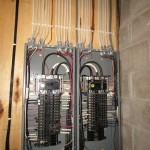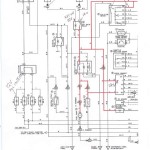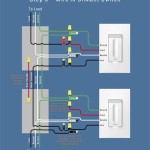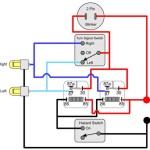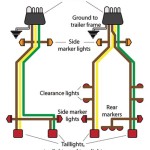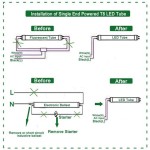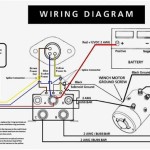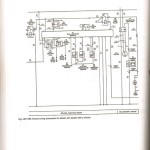Electric trailer brake wiring is a system of electrical connections that enables a towed trailer’s brakes to be activated by the brake controller in the towing vehicle. For instance, a 7-pin connector, which includes a wire for electric brakes, is a common sight on many towing setups, allowing for brake light, turn signal, and brake controller communication.
Electric trailer brake wiring plays a crucial role in ensuring safe and effective braking for vehicles towing trailers. It provides several benefits, including improved braking performance, reduced stopping distances, and enhanced stability while towing. Historically, the development of electric trailer brake wiring has been instrumental in revolutionizing the towing industry, allowing for heavier trailers to be towed safely and efficiently.
In this article, we will delve deeper into the intricacies of electric trailer brake wiring, exploring its components, installation procedures, and troubleshooting techniques. We will also discuss the advantages and disadvantages of different wiring configurations and provide insights into the latest advancements in this field.
Electric trailer brake wiring plays a vital role in the safe and efficient operation of towed trailers. Understanding its essential aspects is crucial for proper installation, maintenance, and troubleshooting.
- Components: Wires, connectors, controller, magnets
- Installation: Requires specialized knowledge and tools
- Troubleshooting: Involves checking for shorts, grounds, and loose connections
- Safety: Ensures synchronized braking between tow vehicle and trailer
- Types: Proportional, time-delayed, inertia-based
- Benefits: Improved braking performance, reduced stopping distances
- Limitations: Can be complex to install and maintain
- Maintenance: Regular inspection and cleaning are necessary
- Regulations: Varies by region and vehicle type
- Advancements: Wireless systems and integrated monitoring
These aspects provide a comprehensive overview of electric trailer brake wiring, encompassing its technical details, practical considerations, and broader implications. Proper understanding of these aspects ensures safe and effective trailer towing operations.
Components
Electric trailer brake wiring comprises an intricate network of components that work together seamlessly to ensure synchronized braking between the tow vehicle and trailer. These components, namely wires, connectors, controller, and magnets, play pivotal roles in transmitting electrical signals, establishing secure connections, regulating braking force, and actuating the trailer brakes.
- Wires: The electrical conduits that transmit signals between the tow vehicle and trailer, carrying commands from the brake controller to the trailer brakes.
- Connectors: Electrical interfaces that establish secure connections between the tow vehicle and trailer, ensuring proper signal transmission and preventing short circuits or loose connections.
- Controller: The central unit that regulates the braking force applied to the trailer brakes, typically mounted inside the tow vehicle and operated by the driver.
- Magnets: Electromagnets attached to the trailer brakes that, when energized by the controller, generate a magnetic force that actuates the brakes, causing the trailer to decelerate.
Understanding the interconnections and functions of these components is essential for proper installation, maintenance, and troubleshooting of electric trailer brake wiring systems. By ensuring that these components are in good working condition and properly configured, safe and effective trailer braking performance can be achieved, contributing to overall towing safety and stability.
Installation
The installation of electric trailer brake wiring systems demands specialized knowledge and tools, as it involves intricate electrical connections, precise wiring, and proper configuration to ensure safe and effective trailer braking. The absence of specialized expertise and appropriate tools can lead to improper installation, compromised braking performance, and potential safety hazards.
Real-life examples underscore the importance of specialized installation. Incorrect wiring, such as reversed polarity, can damage the brake controller or trailer brakes. Loose connections can lead to intermittent brake operation or complete failure, increasing the risk of accidents. Furthermore, improper grounding can create electrical faults that pose safety concerns.
Understanding the principles and techniques of electric trailer brake wiring installation is crucial for both professional installers and DIY enthusiasts. This understanding enables accurate wire routing, secure connections, proper grounding, and correct brake controller setup. It also facilitates troubleshooting and maintenance, ensuring the continued reliability and safety of the trailer brake system. By recognizing the significance of specialized knowledge and tools in electric trailer brake wiring installation, we can promote safe and responsible towing practices.
Troubleshooting
Within the context of electric trailer brake wiring, troubleshooting plays a pivotal role in maintaining the system’s integrity and ensuring safe and effective trailer braking. Electrical faults, such as shorts, grounds, and loose connections, can compromise the functionality of the wiring system, leading to diminished braking performance or complete failure.
Shorts, which occur when an electrical current takes an unintended path, can cause excessive current draw, overheating, and damage to wiring components. Grounds, on the other hand, arise when an electrical current flows through an unintended path to the vehicle’s chassis or frame, disrupting the proper functioning of electrical circuits. Loose connections create high-resistance points that hinder the flow of electrical current, leading to intermittent or weak braking.
Real-life examples abound, underscoring the importance of diligent troubleshooting. A loose connection in the trailer brake wiring harness can result in erratic brake operation, potentially causing the trailer to sway or even jackknife during braking. Similarly, a short in the wiring can lead to overheating and insulation damage, posing a fire hazard. By recognizing the critical importance of troubleshooting in electric trailer brake wiring, we can proactively identify and rectify electrical faults, ensuring the continued reliability and safety of our towing systems.
Safety
Electric trailer brake wiring plays a crucial role in ensuring the safety of towing operations by facilitating synchronized braking between the tow vehicle and the trailer. This synchronization is critical for maintaining stability and control while towing, preventing potential accidents and hazardous situations.
Synchronized braking means that the trailer’s brakes are applied in unison with the tow vehicle’s brakes, ensuring that both the tow vehicle and the trailer decelerate at the same rate. This prevents the trailer from pushing or swaying the tow vehicle, which could lead to loss of control and potential jackknifing. Electric trailer brake wiring achieves this synchronization by transmitting electrical signals from the brake controller in the tow vehicle to the trailer’s brakes, activating them simultaneously with the tow vehicle’s brakes.
Real-life examples demonstrate the importance of synchronized braking. In scenarios where the trailer’s brakes are not synchronized with the tow vehicle’s brakes, the trailer may continue to push forward during braking, causing the tow vehicle to skid or lose control. Conversely, if the trailer’s brakes are applied too aggressively, it may lock up and skid, potentially causing the trailer to sway or even overturn.
Understanding the connection between electric trailer brake wiring and synchronized braking is crucial for both professional and recreational towers. By ensuring that the trailer brake wiring is properly installed and maintained, towers can enhance the safety of their towing operations, reducing the risk of accidents and protecting both themselves and others on the road.
Types
Within the realm of electric trailer brake wiring, the choice of brake controller type is a critical factor influencing the performance and safety of the towing system. Electric brake controllers fall into three primary categories: proportional, time-delayed, and inertia-based, each with its own unique characteristics and applications.
-
Proportional:
Proportional brake controllers deliver a braking force that is directly proportional to the force applied to the brake pedal in the tow vehicle. This type of controller provides a smooth and responsive braking experience, making it suitable for a wide range of towing scenarios. However, it requires precise adjustment to ensure proper synchronization between the tow vehicle and trailer brakes.
-
Time-delayed:
Time-delayed brake controllers apply a preset amount of braking force after a predetermined delay. This type of controller is less sensitive to variations in brake pedal pressure, making it easier to set up and use. However, it may not be as responsive as proportional controllers in all situations.
-
Inertia-based:
Inertia-based brake controllers utilize a pendulum or accelerometer to sense the deceleration of the tow vehicle. When the tow vehicle decelerates, the pendulum or accelerometer moves, triggering the application of the trailer brakes. This type of controller provides a more gradual and natural braking response, making it suitable for heavy trailers or slippery road conditions.
Understanding the different types of electric brake controllers and their respective characteristics is crucial for selecting the most appropriate controller for a particular towing application. By matching the controller type to the specific requirements of the tow vehicle and trailer, owners can optimize the braking performance and safety of their towing system.
Benefits
Electric trailer brake wiring plays a pivotal role in enhancing the braking performance and reducing the stopping distances of vehicles towing trailers. It establishes a direct electrical connection between the tow vehicle and the trailer’s brakes, enabling synchronized and controlled braking action. This integration offers several critical benefits that contribute to safer and more efficient towing operations.
Improved braking performance is a direct result of electric trailer brake wiring. By transmitting electrical signals from the brake controller in the tow vehicle to the trailer’s brakes, the system ensures that both the tow vehicle and the trailer brake in unison. This synchronization prevents the trailer from pushing or swaying the tow vehicle, maintaining stability and control during braking maneuvers. Additionally, electric trailer brake wiring allows for proportional braking, where the braking force applied to the trailer is directly proportional to the force applied to the brake pedal in the tow vehicle. This ensures smooth and responsive braking, further enhancing braking performance.
Electric trailer brake wiring also contributes significantly to reducing stopping distances. By providing a direct electrical connection, the system eliminates delays and inefficiencies associated with mechanical or hydraulic braking systems. The instantaneous transmission of electrical signals allows the trailer’s brakes to be applied almost simultaneously with the tow vehicle’s brakes, reducing the overall stopping distance. This is particularly beneficial in emergency situations or when towing heavy trailers, where every foot of stopping distance can make a critical difference.
Real-life examples demonstrate the effectiveness of electric trailer brake wiring in improving braking performance and reducing stopping distances. In a study conducted by the National Highway Traffic Safety Administration (NHTSA), vehicles towing trailers equipped with electric brake wiring had significantly shorter stopping distances compared to those using traditional mechanical or hydraulic braking systems. This reduction in stopping distance translates to enhanced safety, reduced risk of accidents, and greater peace of mind for drivers towing trailers.
Understanding the connection between electric trailer brake wiring and improved braking performance, reduced stopping distances is crucial for both professional and recreational towers. By ensuring that their trailers are properly equipped with electric brake wiring and that the system is maintained in good working condition, towers can significantly enhance the safety and efficiency of their towing operations.
Limitations
While electric trailer brake wiring offers significant benefits, its installation and maintenance can present certain challenges, requiring specialized knowledge and tools. These complexities stem from the intricate electrical connections, precise wiring, and proper configuration necessary for safe and effective trailer braking performance.
-
Electrical Complexity:
The electrical system involved in trailer brake wiring requires a thorough understanding of electrical principles and circuits. Improper wiring or connections can lead to malfunctioning brakes, posing safety hazards.
-
Specialized Tools:
Installing and maintaining electric trailer brake wiring often requires specialized tools, such as crimpers, wire strippers, and voltage testers. The lack of proper tools can compromise the quality of the installation and increase the risk of electrical faults.
-
Troubleshooting Challenges:
Diagnosing and repairing issues in electric trailer brake wiring can be complex, requiring a systematic approach to identify and rectify electrical faults, shorts, or loose connections.
-
Time-Consuming Installation:
Proper installation of electric trailer brake wiring can be a time-consuming process, especially for those unfamiliar with electrical systems. Rushing the installation can lead to errors and potential safety concerns.
Addressing these limitations requires careful attention to detail, adherence to manufacturer guidelines, and, in some cases, seeking professional assistance from qualified technicians. By recognizing and addressing the complexities associated with electric trailer brake wiring, we can ensure the safe and reliable operation of our towing systems.
Maintenance
Maintaining electric trailer brake wiring is crucial for ensuring its longevity, reliability, and optimal performance. Regular inspection and cleaning help prevent corrosion, identify potential issues early on, and maintain proper electrical connections, contributing to the overall safety and effectiveness of the towing system.
-
Inspect Wiring Harness:
Regularly inspecting the wiring harness for any signs of damage, wear, or loose connections is essential. This includes checking for frayed wires, cracked insulation, or loose terminals. Early detection of any issues can prevent electrical faults and ensure the proper functioning of the brake system.
-
Clean Electrical Connectors:
Cleaning electrical connectors to remove dirt, debris, or corrosion is vital for maintaining good electrical contact. Poor connections can lead to voltage drop, reduced braking performance, or even complete brake failure. Regular cleaning ensures optimal current flow and prevents electrical malfunctions.
-
Inspect Brake Magnets:
Brake magnets should be inspected periodically for any signs of wear or contamination. Worn or dirty magnets can compromise the braking force applied to the trailer wheels, potentially leading to uneven braking or reduced braking effectiveness. Cleaning and replacing magnets as needed ensures consistent and reliable braking performance.
-
Check Brake Drums and Shoes:
While not directly related to the electric brake wiring itself, inspecting the brake drums and shoes is important for maintaining the overall braking system. Worn or contaminated brake linings can reduce braking efficiency and lead to premature wear of the brake magnets. Regular inspection and replacement of brake components ensure optimal braking performance and longevity of the electric trailer brake system.
Regular inspection and cleaning of electric trailer brake wiring, along with proper installation and usage, contribute significantly to the safety and reliability of the towing system. By addressing potential issues early on, maintaining proper electrical connections, and ensuring the integrity of the braking components, we can minimize the risk of failures, enhance braking performance, and extend the lifespan of the entire system.
Regulations
The diverse landscape of regulations governing electric trailer brake wiring stems from variations in traffic laws, vehicle standards, and safety requirements across different regions and vehicle types. These regulations play a critical role in shaping the design, installation, and usage of electric trailer brake wiring systems to ensure the safety and compatibility of towed vehicles.
For instance, in the United States, the National Highway Traffic Safety Administration (NHTSA) sets forth Federal Motor Vehicle Safety Standards (FMVSS) that specify the minimum performance requirements for electric trailer brake wiring systems. These standards dictate aspects such as wire gauge, connector types, and braking force distribution, ensuring that trailer brakes function effectively and reliably.
Furthermore, individual states within the U.S. may impose additional regulations or requirements on electric trailer brake wiring. These regulations can vary depending on factors such as the size and weight of the trailer being towed, the type of towing vehicle, and the intended use of the trailer. By adhering to these regulations, manufacturers and users can ensure that electric trailer brake wiring systems are compliant and safe for operation.
Understanding the varying regulations surrounding electric trailer brake wiring is crucial for both manufacturers and users. Manufacturers must design and produce wiring systems that meet the applicable regulations, while users must ensure that their trailers are equipped with compliant wiring systems. By doing so, we can contribute to the overall safety and effectiveness of towed vehicle operations.
Advancements
Electric trailer brake wiring has witnessed significant advancements with the introduction of wireless systems and integrated monitoring, revolutionizing the way trailers are connected and monitored during towing operations. These advancements enhance safety, convenience, and control for drivers, making towing experiences more efficient and reliable.
-
Wireless Connectivity:
Wireless trailer brake controllers eliminate the need for a physical connection between the tow vehicle and trailer, providing greater flexibility and ease of setup. Bluetooth or Wi-Fi technology allows for wireless communication between the controller and the trailer’s brakes, enhancing convenience and reducing potential wiring issues.
-
Integrated Monitoring:
Advanced brake controllers now incorporate integrated monitoring systems that provide real-time data on trailer brake performance. This information, such as brake pad wear or brake temperature, is displayed on the controller’s screen, allowing drivers to proactively identify and address any issues before they become major problems.
-
Smartphone Integration:
Some wireless brake controllers offer smartphone integration, enabling drivers to control and monitor trailer brakes remotely using a mobile app. This feature allows for convenient adjustments and troubleshooting while on the go, enhancing safety and convenience.
-
Automatic Brake Adjustment:
Advanced brake controllers with integrated sensors can automatically adjust brake gain based on the trailer’s weight and road conditions. This ensures optimal braking performance in various towing scenarios, reducing the need for manual adjustments and improving overall safety.
These advancements in electric trailer brake wiring have transformed the towing experience, enhancing safety and convenience while providing drivers with greater control and peace of mind. As technology continues to evolve, we can expect further advancements that will make towing even more efficient, reliable, and enjoyable.








Related Posts

